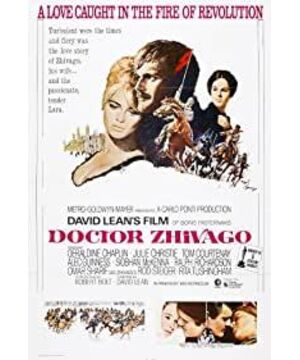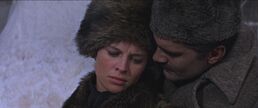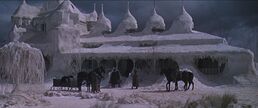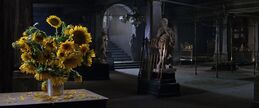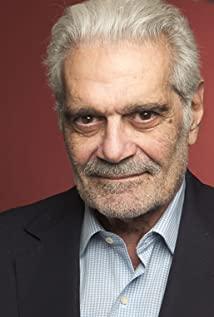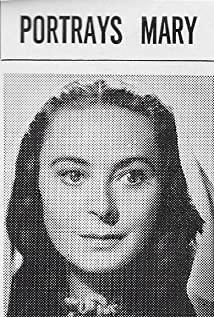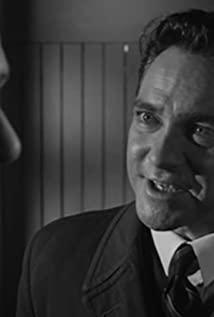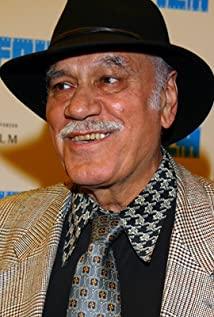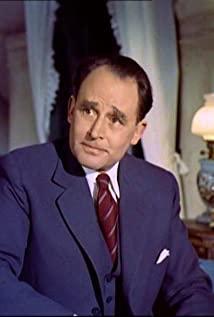This is a 1965 movie. The film is three hours and twenty minutes long. Based on the novel of the same name by Boris Pasternak. The novel won the Nobel Prize for Literature in 1958. This film has been in my hands for a long time, and I only took it out two days ago to watch it. After reading it, I feel like a mess, and I can't figure out a clue. So I found the original book and read it in two days. Then I started watching the movie a second time.
The film recounts what happened to Doctor Zhivago who lived in the old Russian era. His parents died when he was young and he was fostered with relatives. The family treated him very well, and he became a doctor by virtue of his intelligence. Also because of the skill of a doctor, in those turbulent years, he first served as a military doctor for the Russian army, then became a military doctor for the Red Army, and was once captured by the guerrillas as a doctor. Also because it was a former nobleman, many workers and peasants lived in the former mansion, and all the floating wealth was distributed by the liberators. Moreover, besides being a doctor, he is also keen on poetry, complaining in the verses, and dissatisfied with the people who are in charge of the house, so he has to hide everywhere, from Moscow to the Urals, and from the Urals back to Moscow. During the period of suffering from the ups and downs of displacement, but also unexpectedly harvested a few love. This deep emotion accompanied him throughout his short life.
The film uses many scenes to describe Zhivago's love life. Especially in that chaotic era, when people lived today without knowing tomorrow, it had a special flavor, and it has always been a good subject for literati. Such as "Love in 1937", "Love and War", "Love in the Time of Cholera", etc., and many more. But back to reality, for most people, everyone still hopes to have a stable life, women can help their husbands and children, and men commute to get off work on time to support their families. Food and clothing are worry-free, and the years are quiet. Find a lover, at best, as fashion does. Staged a martial arts drama of the main palace junior, causing a small wave of life, and then returning to normal. But in the film described is another kind of love. Dr. Zhivago's wife Tonia is a very virtuous woman, and Dr. Zhivago also loves her very much. Their family is also an uncompromising combination of living standards. But the times did not allow him to love well. In order to make a living, Dr. Zhivago had to abandon his wife and children and leave the family. The encounter between Doctor Zhivago and Lala was during the war. Doctor Zhivago was recruited and Lala went to find her husband. The two work together in such a very special environment. What I see every day is the mutilated limbs, the struggle between life and death, the disappointment in life and the fear of death, forcing them to come together. Later, Zhivago and Lara met each other again, at this time, they both faced the threat of starvation and surveillance, they faced the fate of no future, and their relationship was far from the kind of worldly lover relationship. One day, Lara asked Zhivago, "What should we do?" Zhivago thought for a while, and he understood that what Lara asked was not how they would get along when Tonya came, but how they felt about each other's fate of confusion. He had no choice but to answer: "I don't know." Seeing this, he really felt sad for them. They clearly know that in the face of the great era, the fate of individuals is so small and helpless. However, all they can do is rely on and comfort each other. They are struggling to survive in the howls of wolves around them.
Compared with the original book, the film does not remake the content of the original book in detail, but extracts some typical events, and faithfully expresses the thoughts and lives of Doctor Zhivago and other characters. When talking about the great changes at that time in the original book, there is a passage like this: "In the past, the old social order allowed the leisure class to fantasize and make new and unconventional topics with people without food and clothing. They lived idle lives and talked eloquently, but Only a few people can enjoy it, and most people are starving. But as soon as the lower class stood up, once the privileges of the upper class were abolished, they lost their luster in a blink of an eye and gave up their independence without regret. Thought, they have never actually had independent thinking." The upper classes mentioned in the article are all shown in the film, some of them devote themselves to the revolutionary cause (Egraf), and some use their lives Make bets to speculate on the revolution (Pasha), and some take advantage of the revolution with the heart of a villain (Komarovsky). Only Dr. Zhivago sticks to his beliefs and thinks about the fate of individuals and times in the midst of change. What Pasha thought was: "Personal life in Russia has perished, history has wiped it out." So he catered to change with fanaticism and extreme behavior. What Komarovsky thought was: "There is another kind of man, who is not noble or pure, but who lives well." So he went around and used all kinds of despicable means to make himself "live well". While Dr. Zhivago originally supported social change, he did not understand the sudden and irrational approach to change. He had a conversation with his half-brother Egraf.
Dr. Zhivago: "In front of the operating table, you face a seriously ill patient and completely remove the tumor. That's right."
Egraf: "If you think so, you should join the party."
Dr. Zhivago: "Removing the tumor is a major operation. The person has to stay alive, and you have to do it, like life. Isn't it like that? That's right?"
Egraf: "At this point, it's wrong."
Therefore, Yegraf insisted on his ideals, and has been fighting for the Soviets for his beliefs. And Dr. Zhivago persistently hopes to get rid of this confusion and seeks a way to remove the tumor and prolong his life.
In the common sense, people always equate the general direction of change with the chaos at the beginning of the change. In fact, the difference between the two is huge. The film says: "For the advocates of revolution, the chaos of change is the only situation they love in their hearts." For the overthrown class, this situation of change is abhorrent to them. A brutal and bloody struggle between the two is inevitable. And in this kind of mood, whether it is the party who has won the power or the party who has lost the power, some excessive, extreme, and irrational behaviors are inevitable. (I expressed the same point of view in several other movie reviews, and won a lot of criticism). Check out the history! Qin Shi Huang's tyranny, Caesar's massacre, Cromwell's bloodshed, the revenge of the French Revolution, and the great purge of the Soviet Union. Even the United States, known as the "beacon of democracy", a McCarthyism, has destroyed the lives of countless people. Those who lived in it at that time were unfortunate. But throughout history, these are just small waves in the long river of human development. After all, human beings are slowly moving towards a normal life and making progress slowly. Although this speed is too slow.
Take a look at events that are closer to us. The essential difference between the Bolshevik Party and our Party led by Lenin and other political parties is that it represents the interests of the masses of workers and peasants, who account for more than 90 percent of the population. This is something that has never happened since the birth of political parties. This concept naturally makes people like Dr. Zhivago very incomprehensible. Take a simple example. There is a scene in the Peking Opera "Taking Tiger Mountain by Wisdom". When Li Yongqi told the chief of staff that he was a railway worker, the chief of staff said happily: "That's even more of my own!" This means that in our minds Among them, there are the distinctions of "being more of one's own", "being of one's own", and "not being of one's own". That is to say, there are those who rely on, there are friends, there are fellow travelers, and there are differences in concepts such as enemies. The difference between policy and behavior. This is actually something Chairman Mao warned us long ago. When the masses of workers and peasants want to turn around and live a good life, they will inevitably touch the interests of the upper classes and the masses of non-workers and peasants, and must take measures to deprive them of their property and power. In such a grand change, some innocent people are bound to make sacrifices. In Russia at that time, this unjust social structure in which the rich oppressed the poor had lasted for hundreds of years. The concept is considered to be justifiable. As the old peasant in the film thinks, "Is there another tsar? "It is not difficult to deprive the upper classes of their property and power, but to subvert this concept requires long-term efforts. Therefore, for a political party representing the masses of workers and peasants, because of its goals and objectives, the primary task is to safeguard the interests of the masses of workers and peasants. , to safeguard the interests of "our own people", and then achieve social fairness and justice. Because the Soviet Union chose a wrong path, it was getting farther and farther from its original goal, and the people had to abandon it. It is gratifying that we are now walking on the road of maintaining social fairness and justice.
The film focuses on the fate of small and medium-sized people in the big era. Doctor Zhivago and Lara are little people who are threatened by the times. Lara said: "God, in this terrible age, we are living, it's really a misery." They can't compete with the times, and they can't change their destiny. They can only try their best to adapt to the times, and seek a little better among the few choices. little day. Looking at them, thinking about our past and our present, shouldn't we rejoice? We will cherish a peaceful and peaceful life more, and perhaps have more vision and hope for the future.
The scenery of the film is beautiful and it is well integrated with the plot. Especially depicting the cold winter in Russia, through the frost-covered windows, we appreciate the raging storm, see the snowy land, rolling hills, and the dim moon. Truly a bleak beauty. And when Lala left, the flowers in the vase were falling petal by petal. There is also the crowded station, the crazily crowded crowd, vaguely met fifty years ago.
The original work won the Nobel Prize for Literature. Actually this doesn't explain anything. This award is often given to some second-rate writers. At least that's my personal opinion. Fortunately, the film is top-notch, leaving out many useless and lengthy plots in the original. Every scene is very detailed. How to describe it? Blue is better than blue.
My rating: 8.0.
View more about Doctor Zhivago reviews


